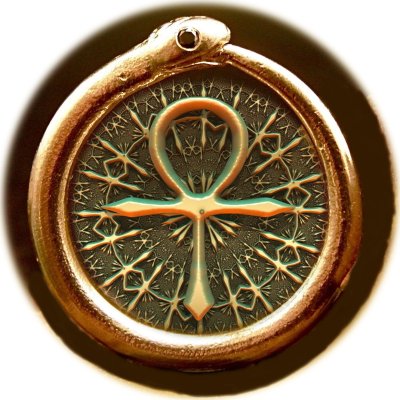What do you think? Since I’m asking the question, probably not, right? Are you surprised? So was I.
In my death-crawl slog through the book Conceptions of God in Ancient Egypt, I find the following passage (pp. 163–64):
At the end of the world there will no longer be men and gods, as is clear from a Ptolemaic parallel text in the temple of Opet at Karnak, which was identified by Eberhard Otto: “There is no god, there is no goddess, who will make himself/herself into another snake” — or, as Otto paraphrased: “The transformed primeval god is alone and no longer has any witnesses to his existence.”
The Egyptians didn’t write about the end of time a lot; they believed that if you wrote something down, you made it come about or gave it power, which is why, in every ancient reference to the god of chaos, Apophis, the name is struck through with a line, like I just did. But they did write about the end of time at least once.
So now I have something in common with atheists: I believe that at some point, my existence will come to an end.
When? Absolutely no idea. Can I expect to live in the Field of Reeds ten years, a hundred years, a thousand, a million? Maybe I’ll get bored with life by then and will not care if I go on.
One of the other books I’m slowly reading is Comforting Thoughts About Death That Have Nothing to Do with God. I bought it since, as I’ve mentioned before, I’m kind of an agnostic when it comes to the afterlife. So in case my ka (spirit) dies with my body, I thought it would be good to read that view of things. But now I know for sure that the ancient Egyptians believed that time would come to an end, and since my temple believes what the ancient Egyptians believed, I guess that is now what I believe.
How do I feel about that? It’s kind of weird.
Here’s the rest of that earlier passage (p. 164):
Only he [the transformed primeval god] and Osiris can change back into the enduring, original form of a snake, that is, into the same form — or rather formlessness — which the eternal enemy of the gods, Apopis, possesses as a power of chaos. It is also visible in the Ouroboros, the snake biting its own tail, as the regenerating nonexistence that encircles the world. The snake remains, but the world it encloses sinks away into the primeval water and vanishes with the gods and all living beings; the state of things before creation returns.
That kind of implies that the universe will come back after the “end of time”, which I think is in line with what modern physics thinks about the universe: that ultimately it will collapse upon itself, and then there will be another Big Bang. (But I’m not an authority on that subject, so if anyone knows differently, please comment below.)
So will I come back when the universe does? That is so far into the future that I believe it’s useless to speculate. From a physics standpoint, I would think not: How can the very same atoms come together in the exact same way a second time? It boggles the mind and defies the laws of probability.
So I will come to an end. I guess I’m okay with that. After all, who wants to live forever?
If you have any comments, please leave them below.


I found this post very interesting as I mentioned in our conversation on TWP. My blog is located at https://deborahbailey914.wordpress.com/
LikeLiked by 1 person
Thanks, Deb! Currently exploring your blog – thanks for the link.
LikeLike